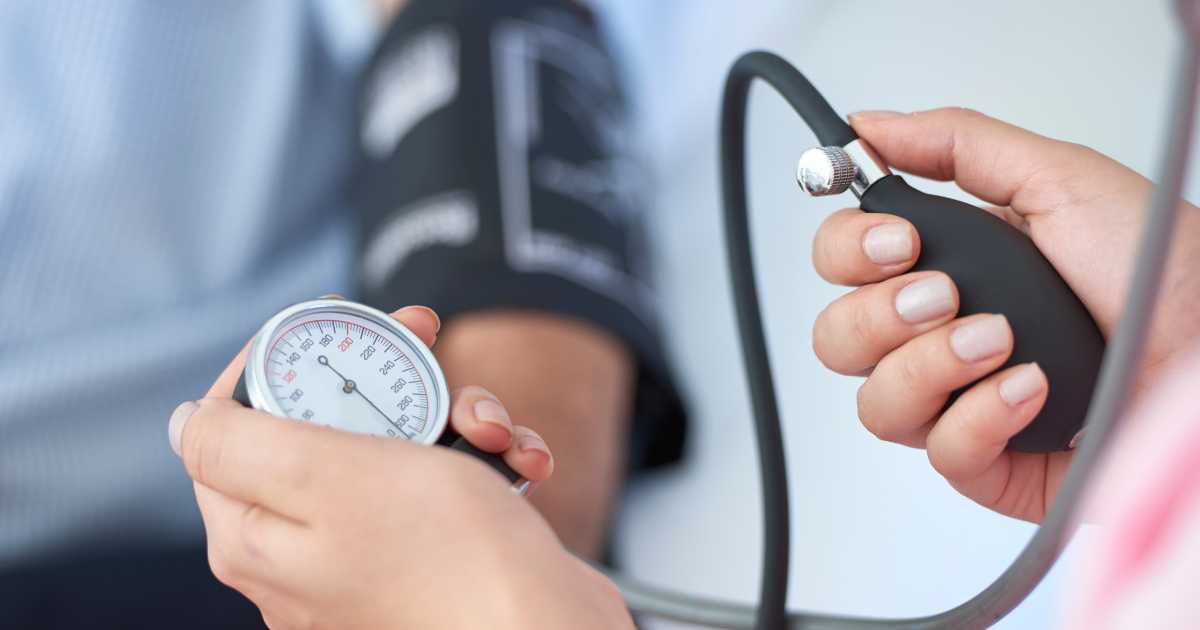According to the Centers for Disease Control and Prevention, nearly 17% of adults binge drink, and over 6% engage in heavy drinking.¹ Alcohol consumption, especially in excess, can harm your mental and physical health, including raising your blood pressure. Learn more about the connections between alcohol use and blood pressure problems.
Understanding How Blood Pressure Works
Blood pressure is the amount of pressure in your blood vessels, including systolic and diastolic.
Systolic blood pressure is the pressure in your heart’s arteries when it contracts, while diastolic pressure is the lowest pressure between heart contractions.²
A healthy heart pumps blood around the body at low pressure. Having high blood pressure means your heart has to pump harder, and the arteries carry blood that flows at a much greater pressure, putting a strain on the arteries and your heart.
Some of the symptoms of high blood pressure are:
- Nosebleeds
- Headaches
- Blurred vision
- Chest pain
- Dizziness
- Shortness of breath
High blood pressure, or hypertension, can increase your risk of heart attacks, strokes, and kidney diseases. It can also put you in danger of developing vascular dementia, which occurs when insufficient blood makes it to your brain.
Alcohol Use and Blood Pressure
Alcohol has a serious effect on blood pressure. It affects the renin-angiotensin-aldosterone system (RAAS), which the kidneys control and which regulate blood pressure using three hormones — renin, angiotensin, and aldosterone.³
Alcohol increases renin levels in the blood, causing blood vessels to constrict. Renin also increases the degree of fluids in the body. By increasing fluid levels and constricting blood vessels, alcohol causes a rise in blood pressure.
Alcohol consumption also increases cortisol levels. Cortisol is a hormone that regulates how the body responds to stress while also regulating inflammatory pathways, immune function, and metabolism.⁴ Higher levels of cortisol release catecholamines, which cause the body to excrete less fluid through urine and increase blood pressure.
Alcohol can also increase the amount of calcium that binds to the blood vessels, increasing their sensitivity to the compounds that constrict them. Constricted blood vessels lead to high blood pressure.⁵
Alcohol decreases baroreceptor sensitivity. Baroreceptors help regulate blood pressure. There are two types — low-pressure baroreceptors and high-pressure baroreceptors.
When blood pressure decreases, the baroreceptors limit how much the blood vessels stretch, and when blood pressure increases, they can trigger the blood vessels to expand so blood pressure stabilizes. Because alcohol prevents baroreceptors from detecting when there is a need for the expansion of the blood vessels, it further contributes to hypertension.⁶
Reducing Blood Pressure
You may benefit from medications if you have high blood pressure, but lifestyle changes can also help.
One of the most important ways to reduce blood pressure is to cut back on your alcohol consumption or eliminate it. Even one drink daily can increase your chances of developing high blood pressure.
If you are overweight, consider losing weight as well. Adding exercise to your daily routine can also help lower blood pressure because it strengthens your heart, letting it pump blood more easily.
You should also stop smoking because nicotine stimulates the release of epinephrine and norepinephrine, two hormones that increase blood pressure.
Getting Help for Alcohol Misuse
Because alcohol use and blood pressure issues are closely linked, having an alcohol use disorder increases your risk of developing life-threatening hypertension.
Getting treatment at a rehab facility can be the first step. The process begins with detox for some people, where you will receive 24/7 care and medications to help you avoid the dangerous withdrawal symptoms that can occur as your body starts to get rid of the alcohol in your system.
Because your body has become accustomed to functioning with alcohol, not having any available can lead to serious complications without medical help.
You can then choose from inpatient and outpatient treatment programs, depending on the level of care you need. Partial hospitalization and intensive outpatient programs can be good choices for those who cannot take time off work to enter residential treatment but still need a high level of care.
Standard outpatient care can be a good way to transition from more intensive alcohol treatment programs to everyday life.
These treatment programs help you get to the cause of your addiction using behavioral therapies and holistic therapies during individual and group therapy sessions.
Afterward, you can turn to aftercare programs to help you achieve long-term sobriety. An aftercare program can provide relapse prevention training, case management services, coping skills, and other tools needed to maintain sobriety.
Choose an Alcohol Rehab in Arizona
Alcohol misuse can affect your relationships, mental health, and physical health. By leading to high blood pressure, alcohol addiction can cause strokes, kidney disease, heart attacks, and vascular dementia.
At Wolf Creek Recovery, we offer alcohol rehab programs to help you find your sobriety. With our various phases of alcohol treatment, including medical detox, we can guide you out of addiction and onto the path to recovery. Call Wolf Creek Recovery today to speak with one of our experts.
Sources:
[1] Data on Excessive Drinking | CDC – https://www.cdc.gov/alcohol/data-stats.htm [2] High Blood Pressure Symptoms and Causes | cdc.gov – https://www.cdc.gov/bloodpressure/about.htm [3] Physiology, Renin Angiotensin System – StatPearls – NCBI Bookshelf (nih.gov) – https://www.ncbi.nlm.nih.gov/books/NBK470410/ [4] Physiology, Cortisol – StatPearls – NCBI Bookshelf (nih.gov) – https://www.ncbi.nlm.nih.gov/books/NBK538239/ [5] Alcohol-induced hypertension: Mechanism and prevention – PMC (nih.gov) – https://www.ncbi.nlm.nih.gov/pmc/articles/PMC4038773/ [6] Effect of alcohol on blood pressure – PMC (nih.gov) – https://www.ncbi.nlm.nih.gov/pmc/articles/PMC8130994/
Finding purpose in pain is what Jonathon does best. He is a strong advocate for those suffering from substance use disorders. As a person in recovery, Jonathon knows how important it is to receive empathy and compassion. He recognizes that each person comes from a different set of circumstances and deserves to be valued and respected.
With a fresh perspective and compassionate attitude, Jonathon works closely with clients to help them let go of the past and know when to take necessary risks. The recovery process is ongoing, which means people need to move forward while applying the skills learned in treatment. Jonathon is a great motivator when it comes time for this!
Jonathon also places emphasis on the family unit and how it can make or break the recovery experience. Individuals with active, supportive families have far better outcomes. Jonathon realizes that it’s impossible to move mountains overnight, but with the right support team and positive attitude, anything is possible.












